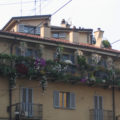
My name is Kelly, and I’m a 17-year-old girl from Adelaide, the capital city of South Australia. I’m fairly average as far as things go, I go to school and have a part time job in a department store, and live in middle class suburbia. I live with my mum and my two younger brothers, and my dad, while separated from my mum, visits often. I am doing a two year accelerated Italian course, and my exam is in less than 3 months! My school offers regular exchange programs and some of my class (there are only 10 of us) decided that over this summer (winter for all you northern hemispherers) they would do this exchange. Unfortunately, due to some complicated circumstance (I think the English teacher had a baby) my school couldn’t do the exchange with the school they normally would do it with, and so we needed to find some students to stay with us during our winter, from somewhere in Italy. Intercultura came to our rescue, as they had too many students going to Perth, Western Australia, and so they sent six boys from varying parts of Italy to stay with us. We got about two weeks notice and so my family made the snap decision to host Sergio, because we wanted to, and because there was no one else who could. Sergio is the same age as me but he’s an only child, like many Italians. He looks typically Italian, not so tall (compared with Aussie guys), olive skin, dark hair and the most amazing deep brown eyes. He found my blue ones equally fascinating. He lives just outside of Reggio Emilia, in the northern Emilia Romagna region but he has his roots in Catania in Sicily though, and so can effectively now speak three different languages, Italian, English and Sicilian.
Sergio spent two months here and we have both learnt so much from each other, and still do as we talk often. Both of us had all sorts of preconceived ideas about what the other would be like, due to stereotypes. Sergio told me that Italians thought that Australians were very much like Crocodile Dundee, and the men treated the women like they were below them. He soon learned that most Australian women are more than capable of telling someone to “Bugger off” and that unfortunately kangaroos just don’t survive in the average suburban backyard, where about 80% of Australians live.
I personally was completely unsure what to expect. Here Italians are portrayed tossing pizzas and twirling moustaches saying “Mamma mia!”, and of course the reputation Italian men have of being unfaithful and slippery lovers. You also get the fast cars, and the beautiful shoes. Of course all these things are present in Italian life, but there is so much more, as I discovered.
Culture, language, geographical differences were often very present, when Sergio came into my family and yet we both discovered that despite these things, we shared the same emotions, ideas, and liked to go out and hang with our friends, flirt (although he did this without thinking), watch movies, play sports and listen to music like most teenagers. We also discovered a mutual love for reading, and had read some of the same books but in different languages! I can’t list all of the differences but here are some I remember…
Language differences were the first to be noticed, as while his English was a lot better than my Italian (which it should be, as he has been studying it for nearly 10 years), it was far from fluent. Luckily my knowledge of Italian, my knowledge of English (the equivalent verb of ‘decompose’ is ‘decomporsi’, and so that choice of word is better than ‘rot’), his knowledge of both the languages, and a little help from the dictionary, enabled us to cross most of these boundaries. Many English words come from Latin words, despite it being a Germanic language, so there are some similarities.
Some of the things were funny, like when he discovered we used the verb ‘to pump’ to describe the action of putting air into an airbed, or to pump water. ‘Pompare’ can have sexual connotations in Italian, which I shall leave to your imagination. He and the other five boys managed to convince my friend Sarah that “Ti faccio un pompino” means, “I break your legs”, when it actually means, “I’ll give you a blowjob”. Typical teenage boy humour coming out there as they found it hilarious when she would yell it at them, thinking it was a threat. I soon learnt to take anything they said with a joking frame of mind.
Anyway, little things came up, like when he asked “Are my hairs ok?’ instead of “Is my hair ok” – because hair is plural in Italian, you ask if all your individual hairs are ok, rather than the body of hair. Makes sense to me. Also, saying, “the my shirt” (“la mia camicia”) instead of just ‘my’. He also found it weird how we Aussies inflect our last syllable, so that ‘no’ sounds like ‘noi’, and we apparently talk too fast and abbreviate everything, which I’m sure is like most languages. I retaliated by saying that at least he doesn’t have to learn at least 30 different conjugations for the verb ‘essere’ or ‘to be’ and know what context you have to use them in. In terms of pronunciation, he was horrified at our lax treatment of vowels, tried to teach me the correct way to say ‘t’ and to teach us all the difference in sound when letters are doubled, like the difference between ‘saremo’ and ‘saremmo’ the future and the conditional ‘noi’ form of ‘essere’. This distinction is important when you come to words like ‘pene’ and ‘penne’, meaning ‘penis’ and ‘pens’ (or pasta) respectively. The whole experience left me thinking about the crazy ways we say things in English and how it doesn’t make a lot of sense at all, as well as a better understanding of Italian, and left him being almost fluent in English.
Language leads into culture quite easily, as you can see from above; most English speakers could quite easily say ‘pump’ without imagining sex. I remember the first big conversation I had with Sergio was about religion. I think it was because Mum wanted to make sure he would be ok about going to church, so it wasn’t such as stupid thing to do as it sounds. Knowing that most Italians say they are Catholic, and my church is a Protestant one, I was curious to learn about the differences. Sergio told me that his family rarely goes to church and that most families are like this. He said that he thinks there is a God, but that he doesn’t agree with many of the Catholic ideals. This had occurred to me, as being a fairly smart girl I noted that most parents in Italy have only one child, and this feat usually requires some kind of contraception. Also, I was told that it is rare for an 18 year old to still be a virgin. Anyway, he was ok with going to church, but was slightly shocked when I took him to a youth group service at another church on Friday night. Think a modern building, a loud band, coloured lights, overhead projector with the song words shown, games being played to show God’s message, most of the crowd being under 30, and after one can play table tennis, drink coke and chat with friends. His words were, “This isn’t a church, this is a discoteca!” That was funny, and I explained to him that it didn’t matter how loud the band played as long as the message was getting across to the kids, very different to the quiet reverence and traditions he had seen in churches in Italy.
Another thing me and my friends who were hosting the other boys discovered was the love of politics. At a barbecue (where we all put our sausages in our bread and they didn’t) a virtual shouting match arose between the six guys, all rapid-fire Italian that none of us could understand.
I asked what it was about, and was told they were discussing politics and the differences between the north and the south of Italy. Sergio, his parents originally from Sicily, was quite fired up at Lucio, the rich boy from Parma. We were just like “Um, ok.” Australians as a whole are pretty laid back and we have very few severe political issues or debates with two major parties both of which are not extreme in any sense, and so politics rarely ever comes up in conversation unless we have a referendum or something.
We had some other different things, ways of seeing life, how important jobs are, family (I have 12 cousins, he has 1) and food. He ate so much, and yet didn’t gain a kilo. I don’t eat a lot because I feel sick if I overeat, but he told me that I would be considered to be sick in Italy because I didn’t eat. Australians are also very fat people, like Americans; and although I believe our fresh food is of good quality we have a lot of fast food alternatives, which Sergio didn’t touch. He also didn’t understand why we would put pineapple on our pizza, or marshmallows in hot chocolate or even milk in our tea.
Gosh, I’ve written so much, only one more paragraph to go. The environment, we discovered, was different here than in Italy. In Italy it is considered a big deal to drive the length of the country, which I believe is about 1000km. It is around 800km to drive to Melbourne, the nearest capital city to Adelaide, and this is a drive my family has done so many times I’ve lost count. This means we have a lot of space, and one of the first comments Sergio had was “Every house has a garden!” Italy is so squished that space saving is a way of life or so I’m told. Another comment was “Everything is so new”. This is because Europeans have only occupied Australia for a little over 200 years, hardly long enough to have ancient monuments. With such a large country we have every type of environment and climate you could want, from tropical in the north to snow in the mountains. Adelaide is fairly mild, a little like southern Italy. We get most of our rain in winter; the daytime maximum rarely ever drops below 10 degrees Celsius, and we get no snow, which Sergio found odd, when he arrived in the middle of winter and it was 13 degrees and we thought that was freezing.
Sergio’s face when he first saw a kangaroo was quite hilarious too. We took him to a nearby wildlife park, as only in the country can you see them, and we were just wandering by them, so used to them, and Sergio just stopped. He couldn’t stop looking at them; it was like he was looking at an alien. It was only then I realized what odd animals they actually are, so once again I was learning through him! We now talk via email and the phone and his parents have said that I am like a daughter to them now and would love to have me stay in the future, which I intend to do!
Probably I could write a whole book on what each of us learnt, both being curious and able to talk to each other for hours, but I won’t! I was lucky in having such a nice guy come and stay, some of my other friends had different experiences with the other guys, so I am very grateful to have had such a great time with him and learn so much.
Editor’s Note:
This has been exchange student week for me. First I heard from Kelly, asking to subscribe to my newsletter and explaining why she was interested. I suggested that she write something about her experiences, which she very quickly did.
Then I got email from a 16-year-old American girl looking for a host family so she could come to Italy on an exchange program next school year. We’re not set up for it ourselves (and are hardly a typical Italian family), but I gave her some suggestions on other places to ask, and will ask around for her as well.














